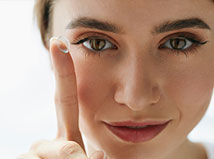
Chapel Hill Allergy
North Carolina Eye, Ear, Nose & Throat offers Chapel Hill Allergy testing and treatments so that you won’t miss a minute of life.
Allergy Testing
Chapel Hill allergy testing can be performed on adults and children, and can be done in two ways. Skin tests are usually done because they are rapid and more reliable than blood tests, but either type of test may be used.
Skin Tests
A small amount of a suspected allergen is placed on or below the skin to see if a reaction develops.
- Skin prick test. This test is done by placing a drop of a solution containing a possible allergen on the skin, and a series of scratches or needle pricks allows the solution to enter the skin. If the skin develops a red, raised itchy area it usually means that the person is allergic to that allergen.
- Intradermal test. During this test, a small amount of the allergen solution is injected into the skin. An intradermal allergy test may be done when a substance does not cause a reaction in the skin prick test but is still suspected as an allergen for that person. The intradermal test is more sensitive than the skin prick test but is more often positive in people who do not have symptoms to that allergen.
Blood Tests
Chapel Hill allergy blood tests look for substances in the blood called antibodies. Blood tests are not as sensitive as skin tests but are often used for people who are not able to have skin tests.
Chapel Hill Allergy treatments so that you won’t miss a minute of life.
Once your allergy testing results have come back, our allergists can recommend treatment methods. Depending on the allergen, our allergists may recommend immunotherapy in the form of allergy shots or sublingual drops. Avoidance of the allergy may also be recommended.
Allergy Shots (Immunotherapy)
For some people, Chapel Hill allergy shots can mean the end of allergy suffering. One method of allergy treatment employed by the allergists at North Carolina Eye Ear Nose & Throat is allergy shots (also called immunotherapy). Allergy shots are given regularly in gradually-increasing doses to increase your tolerance to allergens. Allergy shots may not cure you of your allergies, but they will reduce your symptoms. Allergy shots are effective in treating allergies such as pollen, mold, pet dander and dust mites, but they are not an effective treatment method for food allergies.
Before prescribing allergy shots our ENT doctors will ask about the medications you are taking. Beta blockers and other medications can increase the risk of side effects and may interfere with your allergy treatment.
Sublingual Allergy Drops
Sublingual allergy drops, like allergy shots, are a form of immunotherapy. Unlike allergy shots, however, sublingual allergy drops are not injected but instead are usually placed under the tongue. These allergy drops are often referred to as “sublingual immunotherapy”. Sublingual drops are usually taken at home, as they are usually used several times in a week.
Avoidance
There are times when there may be no effective treatment methods for an allergy, When there is no sufficient treatment available, it is best to avoid the allergen altogether. Once your allergy test results have identified the specific things you are allergic to, you can then determine how best to avoid them. With food allergies, this would involve eliminating the allergen from your diet. Many food allergies in children can be outgrown. Your doctor may recommend repeat testing at specific time intervals. With seasonal allergies, it might involve keeping your home’s windows and doors shut tight and using an allergen reducing air filter.
Pediatric Services Available
At NCEENT, we take care of each child as if they were our own. By offering a wide range of pediatric services, including pediatric allergy care, our providers treat a vast number of common disorders.
